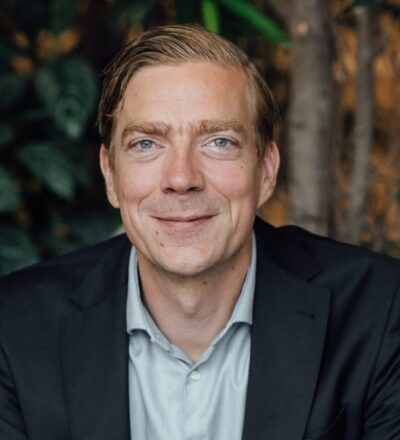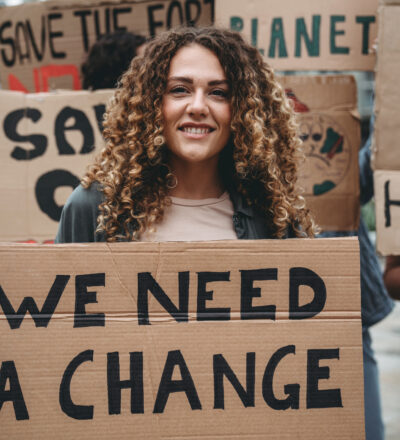As the urgency of the climate crisis intensifies, the imperative for an energy and material transition expands far beyond the confines of our industry. The pursuit of net-zero emissions and a circular economy is not the exclusive domain of corporations. It is a collective responsibility shared by all members of society. In this context, concerted efforts and collaboration across sectors industry, society and government are essential to effectively address the challenges and opportunities of both transitions.
Therefore, in this article, we spoke to climate ambassador Laura de Vries (Climate Ambassador) and social scientists Derk Loorbach (DRIFT / Erasmus University) to discuss how the transition necessitates a socio-economic transformation for sustainable development, with new roles for industry, government, and society within this transformative process.


The transition takes place on multiple levels of society
Laura de Vries kicks off, highlighting the notable progress already made in both transitions. “On a European scale, we are certainly leading the way. In the Netherlands, we have seen significant acceleration in the energy transition, partly driven by geopolitical tensions such as our reliance on Russian gas. This acceleration has heightened societal awareness, influenced by recent price rises and incentives promoting the adoption of solar panels, among other initiatives. In the material transition, there is need for progress. Developments such as recycling are crucial, however, equal attention must be given to other aspects of the R-ladder, such as reduction and refurbishment. I think societal awareness is lower in the material transition, and the industry seems to be driven primarily by political pressure.”
Policies play a key role, notes Laura de Vries: “There is increasing legislation in this area, prompting companies to become more proactively engaged in the transitions. However, legislation and regulations can also hinder progress, acting as barriers. For instance, start-ups in the circular economy face obstacles when scaling up due to certain legislation. These are matters that must be addressed. Financial barriers, notably in investments, also exist. Market dynamics, including insufficient demand for circular products or materials, further complicate matters. While the heart of the transitions relies on legislation, it also boils down to willpower. Urgency should be inherent, not solely mandated by policy.” Therefore, the transitions take place both on business, society, and government levels, Laura de Vries concludes. “Collaboratively, we must aspire for more and grasp the significance of the climate crisis.”
This is part 3 in a series of 3 about the material transition and a circular process industry:
Part 1 – Material transition: the Dutch opportunity to fast-track a circular Europe
Part 2 – From theory to action: Implementing circularity in the Dutch process industry
Part 3 – Material change across industry, government, and society
Towards a new regime
Derk Loorbach, professor of socio-economic transitions at Erasmus University Rotterdam, notes that the transition of raw materials is inherently more complex than the energy transition. This is because it involves not only legislation and industrial innovation but also necessitates a complete restructuring of the economy for a circular economy to thrive. Such a transformation is more fundamental and intricate compared to the energy transition. The socio-economic challenges in achieving this are the primary hurdles.
Derk Loorbach elaborates: “First of all, we need to critically evaluate current policies, which still seem to favour the fossil fuel industry. For example, the energy transition currently focuses on CO2 reduction, aiming to mitigate existing problems rather than fundamentally changing the status quo and phasing out fossil fuels. This presents a narrow definition of the energy transition that relies on technological fixes like CO2 storage and hydrogen, and leads to an approach to invest more to improve what we already have. This model overlooks the inevitability and need for broader societal and systemic changes related to underlying values, economic principles, vested interests and locked-in unsustainable infrastructure. The alternatives that we consider transformative therefore often come from outside the ‘regime’ from social entrepreneurs, grassroots initiatives, social innovators or activists. In the material transition, there are several new business models and scientific insights that advocate for a paradigm shift towards a more sustainable and circular model, but the current institutional and economic conditions still favour the old. Current policies lack alignment with this broader perspective and tools and strategies for true transformation, as they challenge established norms and economic structures without providing suitable tools or frameworks to support alternative approaches.”
Macro-change, impacting the entire economy
Laura de Vries adds on: “Involving society is imperative as the urgency of climate change increases. Politicians should move away from technical discourse and focus instead on a narrative that is accessible to all, highlighting the consequences that will affect everyone. This approach will foster intrinsic motivation to act, which is crucial. Additionally, making sustainable choices should be simplified. Many people want to make sustainable choices but find them either too complex or too expensive. Addressing this barrier is essential. Standardisation and pricing mechanisms can play an important role in facilitating this transition.”
Derk Loorbach adds: “The energy transition and material transition can be seen as macro-changes, impacting the entire economy. Transitions disrupt society’s balance as we navigate between construction and dismantlement. In the long term, dismantlement is inevitable, but the longer it takes, the greater the risk of unrest and unfavorable outcomes. As a society, we need to formulate ideas on how to better manage this, known as ‘transition governance’ in the social-sciences. This involves not planning systematically but gradually driving change, supporting and promoting alternatives, and making them more visible while creating networks of transformative actors rather than to work with representatives of the status quo. It also involves facilitating the translation of these changes into structural shifts in the economy, making them easier or even natural. Think of cities without private cars but with a public mobility system, organized socially rather than left to the market, ensuring it’s not just a profit model for private entities but a social provision. Politicians should ideally facilitate or support this process.”
ISPT develops sustainability programs in consultation with the industry
The complexity of transitioning the process industry is evident. At the Institute of Sustainable Process Technology (ISPT), we assist the industry and society in achieving circularity at multiple levels. Interested in our work? Subscribe to our newsletter, join our community on LinkedIn or contact of our enthousiastic team of experts.
